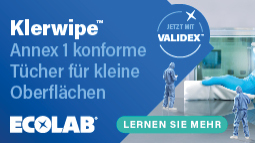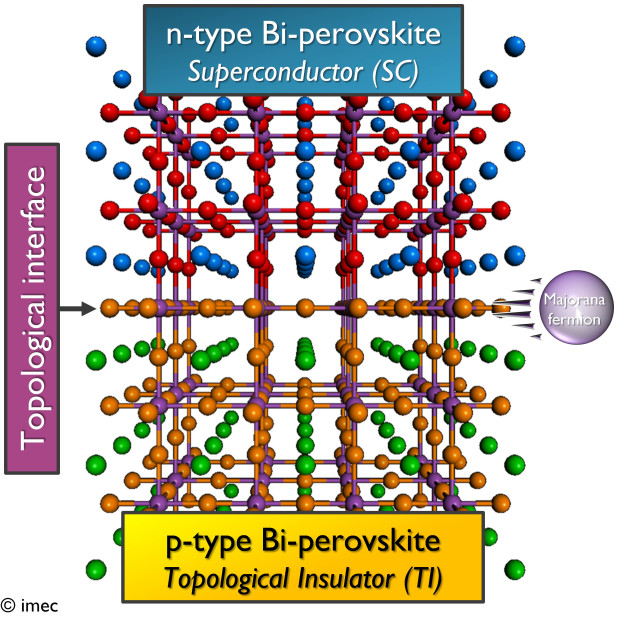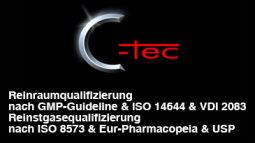Renommierter europäischer ERC-Sonderpreis für Clement Merckling von imec für die Entwicklung fehlertoleranter Qubits vergeben
Imec, eine der weltweit führenden Forschungs- und Innovationszentren für Nanoelektronik und digitale Technologien, gibt heute bekannt, dass der Europäische Forschungsrat Clement Merckling, Abteilungsleiter bei imec, einen Consolidator Grant für die Ausarbeitung seines Projekts NOTICE gewährt hat.
Die bahnbrechende Konzept-Idee dieses Projekts ist die Erforschung neuartiger Oxide und die experimentelle Realisierung topologischer Schnittstellen zur Erzeugung von Majorana-Fermionen, die zu fehlertoleranten Qubits führen werden - Bausteine der Quantencomputer der nächsten Generation. Es wird erwartet, dass diese "Majorana-Qubits" immun gegen Dekohärenz sind - ein Phänomen, das den Verlust von Quanteninformationen induziert. Clement Merckling erhält 2,3 Millionen Euro für dieses ehrgeizige Fünfjahresprojekt, das den Weg zu "stabilen" Quantensystemen öffnen könnte.
Es wird erwartet, dass Quantum Computing eine gigantische Verbesserung der Rechenleistung im Vergleich zum klassischen Computing ermöglicht. Der grundlegende Baustein eines Quantencomputers ist das qubit, ein zweistufiges System, das den Gesetzen der Quantenmechanik folgt. Die aktuellen Entwicklungen konzentrieren sich hauptsächlich auf halbleitende Quantenpunkte und supraleitende Qubits, die vielversprechende Eigenschaften für Quantencomputer und -herstellung aufweisen. Diese Qubits leiden jedoch unter Dekohärenz. Heute wird diese Herausforderung angegangen, indem die Dichte der Qubits (Ziel über 106 pro Chip) hochskaliert und Quantenfehlerkorrekturalgorithmen eingesetzt werden.
"Mit dem ERC Consolidator Grant kann ich die nächste Generation von Qubits erforschen - die Majorana Qubits", erklärt Clement Merckling. "Die größte Herausforderung bei Majorana-Qubits besteht darin, Majorana-Fermionen zu erzeugen, die einen Quantenzustand halten und konservieren können. Der Weg dazu ist, einen Supraleiter auf ein Material mit starker Spin-Orbit-Kopplung (SOC) zu schichten, wie beispielsweise einen topologischen Isolator." Majorana-Fermionen wurden theoretisch vorhergesagt, und in jüngster Zeit wurden erste Signaturen ihrer Existenz durch die Verwendung verschiedener Materialkombinationen und Gerätearchitekturen nachgewiesen.
Im Rahmen des Projekts NOTICE (Novel Oxides and Topological Interfaces for Quantum Computing Electronics) wird der versierte Forscher einen innovativen Weg zur Erzeugung von Majorana-Fermionen gehen. Diese Route wird den heutigen großen Hindernissen gerecht, nämlich der Stabilität und Oxidation der SOC-Materialien und der Fehlerhaftigkeit der Schnittstelle zwischen dem SOC und supraleitenden Materialien. Bahnbrechend ist die Verwendung neuartiger und stabiler Oxidmaterialien - d.h. eines "Perowskit"-Oxids auf Wismutbasis - als Basis sowohl für den Supraleiter (durch p-Dotierung) als auch für den topologischen Isolator (durch n-Dotierung). Diese Materialsystemkombination soll eine perfekte epitaktische Schnittstelle schaffen, an der die Majorana-Fermionen erzeugt werden." In einer letzten Phase wird sich das Team auf die Integration in Si konzentrieren, um zuverlässige und skalierbare Quantengeräte auf Majorana-Basis zu ermöglichen und so den Weg zur großtechnischen Herstellbarkeit zu ebnen.
"Wir sind sehr stolz darauf, dass ein erfahrener Forscher wie Clement Merckling einen ERC Consolidator Grant erhält und damit eine einzigartige Gelegenheit erhält, ein Team zu bilden und ein Pionierforschungsprojekt durchzuführen", sagte Luc Van den hove, Präsident und CEO von imec. "Quantum Computing ist ein sehr vielversprechendes Innovationsfeld für Europa, das über ein enormes Industrialisierungspotenzial verfügt. Die Fähigkeit, die Technologie zu entwickeln und in einem breiten Anwendungsspektrum industriell einzusetzen, ist eine der größten Herausforderungen Europas. Insbesondere dieses Projekt soll das Quantencomputing langfristig revolutionieren. Aber es wird auch neue Horizonte für die Materialwissenschaften und die Epitaxie eröffnen - zwei Bereiche, die wichtige Durchbrüche in vielen anderen Bereichen ermöglichen."
IMEC Belgium
3001 Leuven
Belgien










